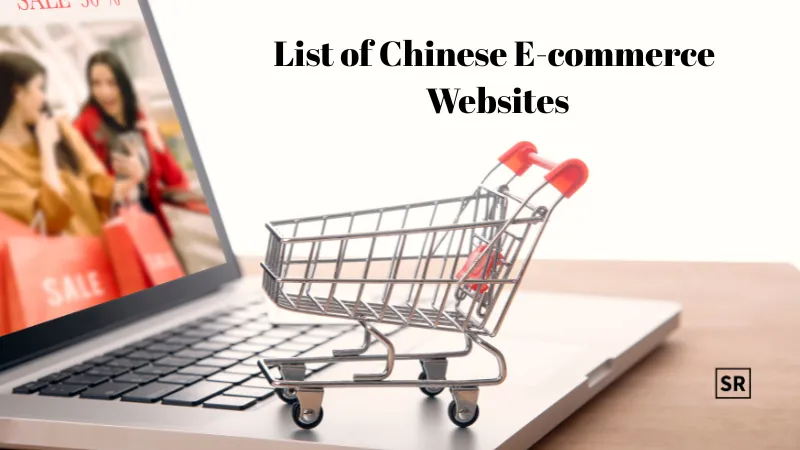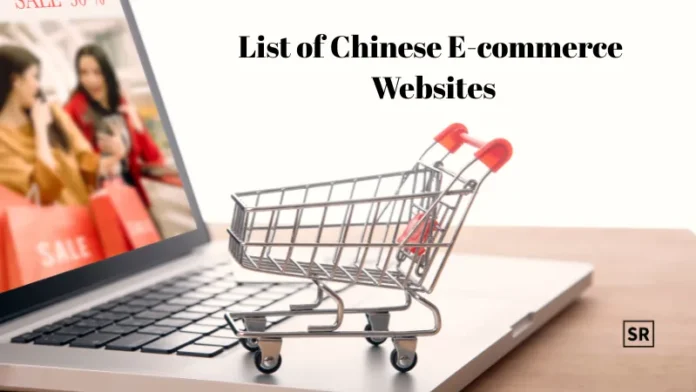
China’s e-commerce market is booming in 2025, with expected revenue of $1,469 billion and about 78.8% of people using online shopping. The market is set to grow by nearly 10% each year until 2029, possibly reaching $2,361 billion.
Mobile payments like Alipay and WeChat Pay are the most popular, showing that people prefer easy and fast ways to pay. New technologies, such as incredibly generative AI, are changing how the industry works. Features like live-streaming and augmented reality are making shopping more fun and interactive.
These trends show how fast China’s e-commerce is growing and why it’s a global leader in online retail.
Best Chinese website for online shopping
Here is the list of top Chinese e-commerce platforms which are changing the whole shopping experience for customers.
Table of Contents
Taobao
- Website: www.taobao.com
- Founded in: 2003
Alibaba Group launched Taobao. It is one of the top ten most visited e-commerce websites worldwide and the largest online marketplace in China. Taobao was a C2C platform initially, but now it serves individuals and small to medium businesses. Taobao offers a wide range of products, including fashion, electronics, and handmade items.
Taobao attracts many consumers by celebrating creativity and individuality with over 10,000 merchants.
Taobao is a trusted platform due to its integration with AliPay, which is China’s popular payment system. Taobao’s innovative marketing has turned “Singles Day” into the biggest shopping festival in China, which showcases its influence on consumer trends.
Tmall & Tmall Global
- Website: tmall.com
- Founded in: 2008
Tmall is a popular Chinese e-commerce website, and it has been the largest B2C platform in China since it became independent from Taobao in 2011. Tmall focuses on established brands and retailers. It provides a trusted space for selling brand-name goods directly to consumers. Tmall has a higher entry barrier for sellers to ensure quality.
Tmall Global, a sub-platform, is China’s largest B2C cross-border e-commerce site, connecting international brands with Chinese consumers eager for foreign products. Tmall hosts official brand stores featuring over 200 premium brands like Cartier and Chanel and is committed to preventing counterfeit goods, especially in high-end categories.
Tmall Global allows direct shipping from abroad and fast customs clearance, hosting over 29,000 overseas brands from 87 countries. Most brands on Tmall Global are new to the Chinese market, making it a key entry point for international businesses.
JingDong
- Website: jd.com
- Founded in: 1998
JD.com was originally an online magneto-optical store. It has become China’s largest B2C online retailer and a major competitor to Alibaba. It grew from selling optical products to a wide range of goods which highlights its adaptability and strategic vision.
The company has built a strong logistics network with over 1,600 warehouses worldwide, which ensures fast and reliable delivery. As of November 2023, 90% of purchases arrive within the same or the next day, which helps it reinforce its reputation as a trusted retail platform.
JD.com uses advanced technology, which includes uncrewed vehicles and automated warehouses. It was the first company to conduct commercial drone deliveries. Its R&D center in Silicon Valley focuses on machine learning, cloud computing, big data, and AI. It provides valuable insights into consumer behavior.
Douyin
- Website: douyin.com
- Founded in: 2016
Douyin was launched by ByteDance. It is a popular short-form video platform known as TikTok outside of China. It allows creators to share links through live streams from Douyin’s store. Douyin introduced Douyin Pay in January 2021 to create opportunities for overseas brands to explore cross-border e-commerce.
The platform features a wide range of content to fill a unique space in China’s digital landscape where platforms like YouTube and Facebook are unavailable. Douyin stands out by integrating social interactions with shopping, which allows users to move from watching videos to making purchases seamlessly.
Douyin uses intelligent algorithms for interest-based e-commerce with a strong user base which recommends products based on individual preferences. This enhances the user experience and positions Douyin as a leader in social commerce in China.
Pinduoduo
- Website: pinduoduo.com
- Founded in:2015
Pinduoduo is a dynamic Chinese third-party e-commerce platform that started with agricultural products. It has rapidly grown to become the world’s fastest-growing company and achieved nearly 50% annual growth. It now offers a wide range of products, including apparel, childcare items, food, and cosmetics, which established itself as a key player in global e-commerce.
Pinduoduo has an extensive seller network with access to over 5.1 million merchants, which creates a diverse shopping experience. Pinduoduo is known for its attractive prices, and it often offers discounts of up to 90%. Its unique “team purchase” service allows users to form groups for even more significant discounts.
Xiaohongshu
- Website: xiaohongshu.com
- Founded in: 2013
Xiaohongshu, also known as Little Red Book, is a Chinese social e-commerce platform. It started as a community for travel and lifestyle reviews and has now become a lively marketplace for many brands. Initially focusing on beauty and fashion, the platform mainly attracts millennials and Gen Z, making it a popular place for pre-purchase research.
Users post “shopping notes” with text, photos, and short videos that influence buying decisions. These product reviews are critical to Chinese consumers. Chinese celebrities and influencers also use Xiaohongshu, which adds extra trust to the products shared.
Vipshop
- Website: vip.com
- Founded in: 2008
VIP.com(Vipshop) is a leading Chinese e-commerce website which specializes in discounted fashion, beauty and lifestyle products from well-known brands. Its success comes from a “flash sale” model that offers time-limited deals on high-quality merchandise, which makes it popular among bargain-seeking consumers.
Vipshop is known for its deep discounts, limited-time offers and quality guarantees which help them attract price-conscious shoppers. VIP.com collaborates with international luxury brands like Tommy Hilfiger and Fendi to provide a range of stylish goods.
VIP.com integrates with WeChat, which allows users to access its services directly as a mini-program without needing a separate app. It has a sub-platform called Vip International for cross-border shopping to ensure product quality. The company focuses on fast delivery through advanced technology and a dedicated logistics network.
Kaola
- Website: www.xiaohongshu.com
- Founded in: 2015
Kaola was launched by NetEase. It is a growing Chinese e-commerce platform that focuses on cross-border trade. It offers a wide range of products with focus on fast delivery and cost-effectiveness. Kaola has quickly become one of China’s largest cross-border e-commerce platforms, as it established branches in over 10 countries. This global approach allows it to source high-quality products directly.
Kaola showcases innovative community engagement through its “Zhong Cao She Qu” tab, which acts as a forum for users to seek advice, share feedback and create wish lists. Kaola offers flexible collaboration options with both self-operated and third-party vendors to provide a diverse product range.
Dangdang
- Website: dangdang.com
- Founded in: 1999
Dangdang is a popular Chinese e-commerce website. It was started by focusing on books but expanded its services to offer a wide range of products, which includws electronics and apparel. It is a well-known platform for its cultural influence and diverse product selection, which makes it a popular choice for consumers, who are looking for convenience and cultural exploration in their online shopping.
Dangdang holds over 50% of the online book market share, which makes it a major platform for book lovers. It has built a reputation for reliable service, timely deliveries and high-quality standards with years of experience which fosters trust among users. Dangdang plays a crucial cultural role, as it promotes intellectual exploration and cultural engagement through its focus on books beyond being just an e-commerce site.
Suning
- Website: Suning.com
- Founded in: 1990
Suning.com is China’s leading online-to-offline (O2O) smart retail platform. It is developed by one of China’s largest retail enterprises. It offers a wide range of products, which includes home appliances, electronics, books, household items, cosmetics and baby care products. Suning.com serves as a destination for essential goods and services with over 3 million SKUs.
Suning stands out among other e-commerce by focusing on smart retail integration and O2O strategies. The brand excels in omni-channel operations, which provides seamless shopping experiences across physical stores and mobile devices.
Conclusion
China’s e-commerce market is set to grow strongly in 2025, led by major online platforms. The business-to-business (B2B) side is also growing fast, with a yearly growth rate of 11% expected from 2025 to 2030.
By 2025, around 915.1 million people in China are expected to shop online, showing how popular e-commerce has become. Cloud-based SaaS tools are helping make deliveries faster and allowing businesses to sell in global markets.
These changes show how quickly China’s e-commerce is growing, making it a world leader in online shopping.
FAQs
What is the most popular e-commerce site in China?
Alibaba’s Taobao and Tmall lead China’s e-commerce market with a 50.8% share, followed by JD.com at 15.9% and Pinduoduo at 13.2%.
What is the best Chinese online shopping site?
The top 4 Chinese e-commerce platforms in 2025 are Taobao, Tmall, JD.com, and Pinduoduo.
What is the largest e-commerce company in China?
Alibaba continued to lead China’s e-commerce sector with a market value of around 1.57 trillion yuan.





